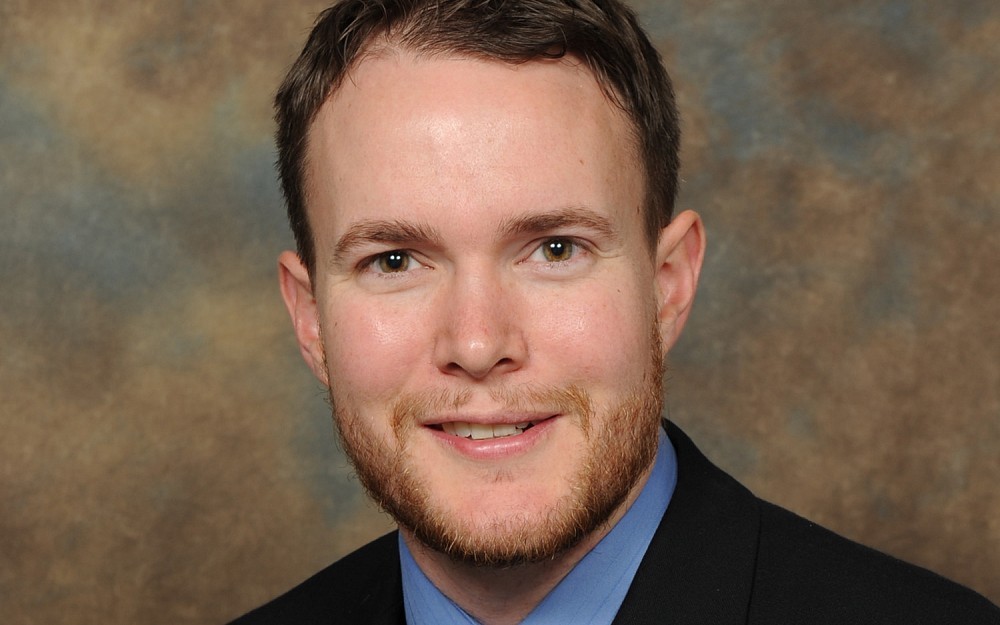
Clinical Trial Uses Computer Program to Address Social Anxiety and Drinking
CINCINNATIA University of Cincinnati (UC) researcher is conducting a clinical trial to evaluate the usefulness of a new computer program designed to help people develop healthy mental habits related to alcohol and social anxiety.
Joshua Magee, PhD, research assistant professor in the Department of Family and Community Medicine, says the Attention Modification Program (AMP) attempts to change what individuals with social anxiety and problem drinking focus their attention on in daily circumstances.
"We think that the way that people pay attention to things in their environment is important for both causing and maintaining social anxiety and alcoholism, says Magee, principal investigator for the clinical trial at UC. "Whats really interesting is much of this attention is outside of our control or awareness.
"For instance, if I am walking down the street and looking around, I may not be closely monitoring what I am seeing; But if I am somebody who is socially anxious, my brain is more likely to zero in on that person who walks by with a threatening expression on his or her face.
"There are similar concerns for someone with alcohol problems, adds Magee. "Again, if I am walking down the street and there is a liquor store nearby, if I have alcohol problems my brain is going to be more likely to notice it. Both of these attention patterns (social anxiety and alcohol) are part of a chain that we think leads to problems.
As part of the clinical trial, participants will use the AMP during eight 30-minute sessions spread across four weeks. The AMP is entirely administered on a computer; during each session pictures of information related to alcohol (such as bottles of beer or glasses of wine) and pictures of information related to social interactions (such as people conveying different facial expressions) will appear on the computer screen.
If successful, AMP would train participants to attend to this visual information in new ways.
Participants will be asked to simply respond to different visual information that appears on the screen as quickly and accurately as possible. Reaction times for responding to the visual information will be measured and goals will be set to decrease reaction times and increase accuracy during the four-week AMP procedure.
"As part of the trial, the computer program gives participants various types of stimulifor example, faces that are threatening versus faces that are neutral, says Magee. "We have participants doing unrelated reaction time tasks that require them to respond as quickly as they can to a letter that pops up.
"It uses classical conditioning to inch their attention away from those negative things their brain wants to focus on. These computer training paradigms are exciting because they shift attention styles that are typically beyond peoples conscious control or awareness.
Magee says the clinical trial has been operational for the past six months with about 40 participants.
For the study, there will be four groups: One will receive both anxiety and alcohol attention training, one will receive anxiety attention training only (with placebo alcohol training), one will receive alcohol attention training only (with placebo anxiety training) and one will receive both placebo anxiety training and placebo alcohol training. It is a double-blind trial, which means neither the investigator nor the participant knows whether the participant receives a placebo or the proposed treatment.
The trial at UC is sponsored through a National Institute on Alcohol Abuse and Alcoholism grant awarded to Elise Clerkin, PhD, assistant professor of psychology at Miami University. Study collaborators include investigators from Brown University and Harvard University.
To be eligible for the trial, participants must be at least 18 or older, drink regularly, feel anxious in social situations and be willing to consider cutting down on drinking, says Magee. Participants will also be compensated up to $200 for their participation.
"We hope this will be an effective method for reducing social anxiety and drinking we can translate out into community settings. It would give people an inexpensive way to reduce these symptoms that is less dependent on a doctors schedule and could be done at home, says Magee. "They can use it on their own time.
For more information about the trial or to enroll, call 866-267-5165 or email blockssn@uc.edu.
Tags
Related Stories
Yahoo News: Doctors see rising rates of colon cancer in younger...
May 1, 2024
Yahoo News featured comments from the University of Cincinnati's Rekha Chaudhary in a story about rising rates of diagnoses and deaths from colorectal cancers among young people.
Neuroimaging, AI help detect brain changes
May 1, 2024
Researchers at the University of Cincinnati and Dell Medical School at the University of Texas at Austin are leading a study using state-of-the-art neuroimaging techniques and artificial intelligence to identify changes in the brains among children of adults living with bipolar disorder.
From flight nurse aspirations to health care innovation: Meet...
April 30, 2024
We can thank flight nurses to Bachelor of Science in Nursing, Class of ’97 alumnus Nick Dobrzelecki’s interest in nursing. More than 30 years since making that decision, Dobrzelecki has not yet flown as a nurse, but has impacted the health care industry on many fronts.
